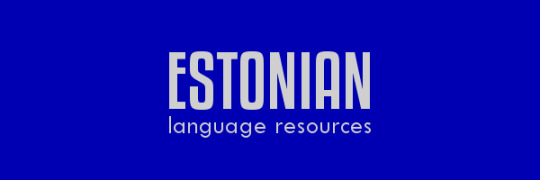#i may add a section on idiosyncracies for someone learning from an english base
Explore tagged Tumblr posts
Text

About Estonian
"Did You Eat the WHOLE Cake?" On Learning Estonian by Judith Knott (Deep Baltic) | “Estonian is popularly known as a difficult language to learn. Much of its vocabulary is unfamiliar, as the only other national languages it’s related to are Finnish and, more distantly, Hungarian. It’s even been described as the most difficult Latin-alphabet language for a native English speaker, and some of its features have assumed an almost mythical status. From my experience so far, I would agree that it’s challenging, but one of the coping strategies is to focus on one’s own reality as a learner (which will be different for each individual) and not be daunted by the myths.”
The Estonian Language by Urmas Sutrop (The Estonian Institute) | A booklet covering the history of the Estonian language, an overview of grammar and syntax, and information on dialects and related languages. (FR/GER/SWE)
Online language programs
Keeleklikk / Keeletee | These online, multimedia programs from the Estonian government cover levels 0-A2 and B1-B2, respectively. Both include feedback and correspondence with professional Estonian language teachers (all free!).
Speakly | This program is most similar to Duolingo, and has extra features like listening exercises to explore. If you look around the internet, you can often find a free code. And in 2021, there is a new simplified free version on mobile.
Some quality older resources have gone offline: Lingvist’s short course in Estonian, and Kultuuriklikk, a companion to the Keeleklikk series that introduces Estonian culture at a B level. I hope they will be back some day!
Language textbooks
E nagu Eesti / T nagu Tallinn / K nagu Kihnu | This widely used series is the current standard for classroom instruction. Independent students may find it a challenge, because while there are EN/RUS/FI glossaries, all of the teaching is in Estonian.
Estonian Textbook | Though the author is now also recognized as a Soviet spy, this book contains some of the best explanations of Estonian grammar available in English.
There are other widely available Estonian books, such as from the Teach Yourself or Colloquial series. I don’t think they are as focused or well-organized as the texts above, but it’s not to say you can’t get some value from them.
Media
Television | Eesti Televisioon is the national public broadcaster in Estonia. Its native language programming is mostly free to stream worldwide. See what is airing this minute in Estonia or browse the archive.
As far as I know, there isn’t a “slow news” service, but some programs have closed caption options. People tend to speak more clearly on the chat shows, although the subject matter can be more abstract than on scripted TV.
Music | There’s more to Estonian music, but the Laulupidu is a good place to start. The Üheslaulmine from 2018 is a more casual sing-along.
Podcasts | Many options among those listed at podcastid.ee and the public radio podcasts at Vikerraadio. One to check out is “Järgmine peatus,” where guests share their travel experiences (Estonians love to travel!).
Newspapers and magazines | Some old school newspapers are Postimees and Eesti Päevaleht. On the magazine side, Anne & Stiil is something like Estonian Cosmo. Sirp and Müürileht are higher brow cultural magazines; Edasi follows current affairs.
Online dictionaries and tools
Eesti - Inglise - Eesti sõnaraamat | Estonian - English dictionary.
Sõnaveeb | An Estonian-only dictionary, but one with a great interface and extras like verb conjugations, and a simpler version for language learners.
Eesti keele seletav sõnaraamat | A dictionary that provides correct examples of word usage.
Sihitisesõnastik | A dictionary to find the correct object case of a verb.
Eesti Keele Instituut | Home of many more specialized dictionaries and resources.
Filosoft | Tools to find word stems and conjugations and declinations.
#estonian#eesti keel#langblr#estonian language resources#finno-ugric#suggestions and corrections welcome obvi!#i may add a section on idiosyncracies for someone learning from an english base#but this seemed like enough to start
454 notes
·
View notes